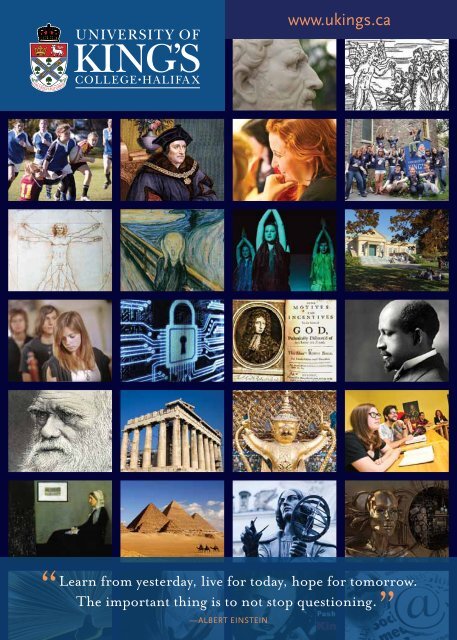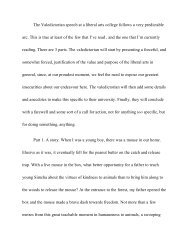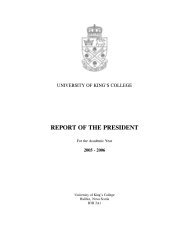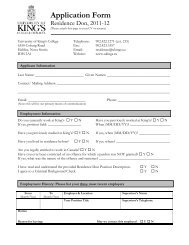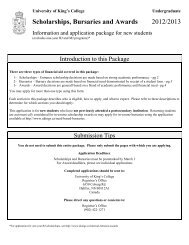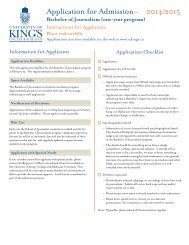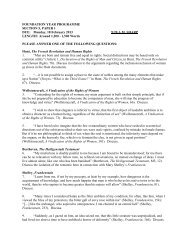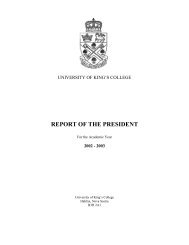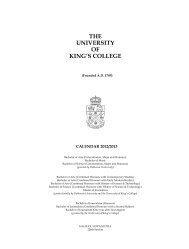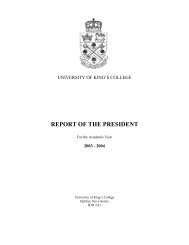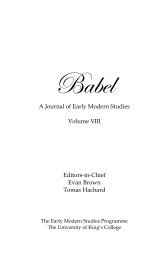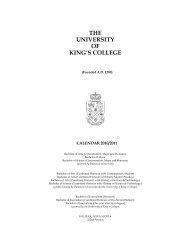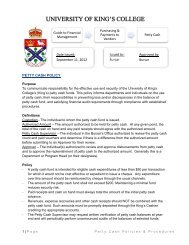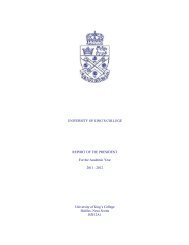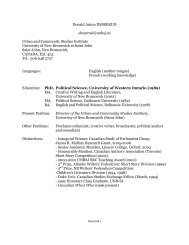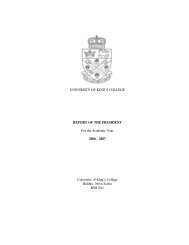intellectual curiosity - University of King's College
intellectual curiosity - University of King's College
intellectual curiosity - University of King's College
You also want an ePaper? Increase the reach of your titles
YUMPU automatically turns print PDFs into web optimized ePapers that Google loves.
DEO REGI LEGI GREGIwww.ukings.caDEO REGI LEGI GREGI“Learn from yesterday, live for today, hope for tomorrow.The important thing is to not stop questioning.”—Albert einstein
Your undergraduate years will be like no others in your life.You will never again have so much concentrated energy, enthusiasm and<strong>intellectual</strong> <strong>curiosity</strong> at your disposal. Nor will you have the time andfreedom to uncover the hidden connections and meanings inthe world around you simply for the joy <strong>of</strong> understanding.
Bring your passion for learning, your creativity and your <strong>curiosity</strong>to the <strong>University</strong> <strong>of</strong> King’s <strong>College</strong> in Halifax. In return, we<strong>of</strong>fer you a supportive, tradition-rich community where you can growas an individual and fully engage in an intensive and rewarding<strong>intellectual</strong> journey. We are dedicated to providing an educationthat inspires you to discover the full extent <strong>of</strong> yourpotential—for whatever you choose to do next.
FJoin Our Communityirst and foremost, King’s is a community. Weare a community <strong>of</strong> interdisciplinary learning,where students and faculty passionately discuss thegreat texts <strong>of</strong> Western civilization. It’s a communitywhere the university’s rich 220-year history isvalued and new traditions are created. It’s acommunity <strong>of</strong> 1,200 students where the <strong>intellectual</strong>and extracurricular life are in harmony. At manyuniversities, a sense <strong>of</strong> community needs to becreated. At King’s, it happens naturally.An Interdisciplinary ApproachSeldom does the world present its questions andquandaries in neat packages contained within theboundaries <strong>of</strong> a single discipline. Increasingly,organizations and companies are recognizing thattheir strength lies in people who can solve problemsby questioning, thinking and evaluating issues in alarger context and from several perspectives.Most post-secondary institutions continue toteach using the historic division <strong>of</strong> subjects intoseparate disciplines. King’s became a model forother Canadian universities when the FoundationYear Programme (FYP) was introduced over35 years ago. As you’ll see in the programme’sdetailed description, we have eliminated thetraditional separations between subjects, focusinginstead on the ways they interact and overlap. AndFYP is just the beginning. We have extended ourinterdisciplinary approach into a complete fouryearundergraduate <strong>of</strong>fering, including combinedhonours programmes in Contemporary Studies,Early Modern Studies, and History <strong>of</strong> Scienceand Technology.Good neighboursKing’s is a neighbour and partner <strong>of</strong> Dalhousie<strong>University</strong> – the region’s foremost teaching andresearch institution. The King’s-Dalhousierelationship means that your learning andleisure opportunities are greatly multiplied.Joint Faculties <strong>of</strong> Arts and Social Sciences andScience allow you to seamlessly select from morethan 2,500 classes and a myriad <strong>of</strong> programmeoptions. Arts, science and music degrees areconferred by Dalhousie in association with, orjointly with, the <strong>University</strong> <strong>of</strong> King’s <strong>College</strong>.As a journalism student you will also benefitfrom our relationship with Dalhousie. Youmay choose to pursue a combined honoursdegree in journalism and a second subject inarts or science at Dalhousie or in one <strong>of</strong> King’sinterdisciplinary programmes.As a King’s student you have access to Dalhousielibraries, student services and an extensiveathletic complex. Given the intimacy andspecialization <strong>of</strong> King’s and the pr<strong>of</strong>ile andscope <strong>of</strong> Dalhousie, it’s no wonder that ourstudents get excited about the possibilities.“Your undergrad is not only aboutthe subject you study—it’s about theskills you learn and the communityyou become a part <strong>of</strong>. ”Coren Pulleyblank ’09, Toronto, Ontario, CombinedHonours in History <strong>of</strong> Science and Technology and Classics ’09Living the King’s experienceKing’s is a place where you are surrounded bypeople who know you by name and care aboutyour development. It’s a place where peoplewho share a passion for learning feel at home.2 <strong>University</strong> <strong>of</strong> King’s <strong>College</strong>
“A thought,even a possibility,can shatter andtransform us.”—Friedrich Nietzsche<strong>University</strong> <strong>of</strong> King’s <strong>College</strong> 3
spend more time on campus than not. Thedynamic King’s community, with its full slate <strong>of</strong>student-led social activities, will <strong>of</strong>ten keep youclose to home.Our students love the camaraderie and personalgrowth which come from residence life. Whetheryou’re a residence or day student, wherever you goon campus, you’ll always run into friends. You’llknow the faculty and staff, and they’ll know you.It’s an ideal climate for discovering who you areand who you want to become.Halifax: The place to beIf you’re looking for a friendly and vibrant citywith lots <strong>of</strong> young people, come to Halifax. Eightinstitutions <strong>of</strong> higher learning in one placemeans an abundance <strong>of</strong> <strong>intellectual</strong> energy andplenty <strong>of</strong> fun to be had. Perhaps you’ll spenda Saturday morning downtown at the HalifaxFarmers’ Market before meeting up with friendsat one <strong>of</strong> the city’s many c<strong>of</strong>fee shops. Saturdaynight you might take in a play or film screening,go dancing orwatch yourfavourite sportsteam, choiceswhich are allwithin walkingdistance <strong>of</strong> King’s.Just don’t besurprised if youIt’s easy to recognizea King’s studentKing’s is a place where we value and nourishideas. Discussions flow effortlessly from thetutorial room to the stairwell, across the campusto the dining hall and back out into the quad.There’s no better environment for developingan analytical eye and an inquiring mind, orfor growing as an individual while you explorepossibilities. Pr<strong>of</strong>essors from other institutionssay it’s easy to recognize King’s students by theway they apply logic, the way they ask questions,and their writing ability.Great books. Inquisitive minds. Individualism.Expansive spirit. Abundant energy. You’llfind King’s students are as uncommon andindividual as the university they love.A Rich HeritageAn early view <strong>of</strong> King’s<strong>College</strong>, Windsor,by Benjamin GerrishGray (1803).<strong>University</strong> <strong>of</strong> King’s<strong>College</strong> Archives.The <strong>University</strong> <strong>of</strong> King’s <strong>College</strong> was founded inWindsor, Nova Scotia, in 1789 by Anglican Loyalistswho moved to Nova Scotia in the wake <strong>of</strong> theAmerican Revolution.At the time <strong>of</strong> its establishment, it was, with theexception <strong>of</strong> the 15th century King’s <strong>College</strong>s inCambridge and Aberdeen, the only foundation<strong>of</strong> that name in existence.In 1923, following a disastrous fire in 1920, King’saccepted a generous grant from the CarnegieFoundation and moved to Halifax and intoassociation with Dalhousie <strong>University</strong>.4 <strong>University</strong> <strong>of</strong> King’s <strong>College</strong>
“After silence, that which comes nearestto expressing the inexpressible is music.”—Aldous Huxley<strong>University</strong> <strong>of</strong> King’s <strong>College</strong> 5
Foundation Year Programme“It really changed the way I looked atthe world. The Foundation Year completelyopened my eyes to so many areasthat I thought I knew about because Idid have a great high school educationand had grown up surrounded by ideasand the arts....But I had never seen thispicture that was suddenly opened up tome, and never thought about some <strong>of</strong>the areas that I could study. ”DR. ROBERTA BARKER, King’s graduateIB graduate, Western Canada High SchoolChair, Department <strong>of</strong> Theatre, Dalhousie <strong>University</strong>Member <strong>of</strong> the King’s-Dalhousie joint facultyCan you imagine discussing The Odyssey overlunch or staying up late at night in yourresidence room talking about Machiavelli? Can youpicture yourself debating the meaning <strong>of</strong> Kant’scategorical imperative on the bus? Such is life inthe King’s Foundation Year Programme (FYP).When King’s introduced FYP in 1972, it became amodel for many other Canadian universities. Thishighly respected programme presents studentswith a dynamic and challenging first year <strong>of</strong>university study, where the traditional boundariesbetween academic subjects are replaced by aseamless survey <strong>of</strong> the Western tradition from itsbeginnings in the ancient world to our own time.Rather than taking a number <strong>of</strong> differentassignments, you will discover how fundamentalideas in the humanities, social sciencesand natural sciences are intertwined. Thecurriculum is highly coordinated and theassignments are well-paced, which means youcan put your focus where it belongs: on the greatworks which are at the heart <strong>of</strong> the programme.Taught as a single intensive and interdisciplinarycourse, FYP provides both a solid foundationfor future studies and a unique opportunityfor reflection before later specialization. Onlyavailable to those enrolled at King’s, FYP attractsstudents interested in pursuing degrees in arts,journalism and music, and it is a popular choicefor science students seeking a grounding inthe humanities. It satisfies the introductoryrequirements for many departments at Dalhousieand programmes at King’s, allowing for asmooth transition into second year.Immerse yourselfAs you can see from the sample reading list onpage 8, you will follow the development <strong>of</strong> Westerncivilization through selected great texts. You willgrapple with these works,questioning them as theyquestion you. And you won’t be embarking on this<strong>intellectual</strong> journey alone. You will be immersedin a supportive community, surrounded bystudents and faculty who know each other asindividuals and recognize the value <strong>of</strong> educationfor its own sake. This collegial feeling is fostered bythe fact that King’s limits FYP enrolment to about300 students, and that the majority <strong>of</strong> students inresidence are in the programme.Question and growThe FYP faculty is dedicated to interdisciplinaryteaching where pr<strong>of</strong>essors and students alikeform a community. After each day’s lecture,the class breaks into tutorial groups <strong>of</strong> about15 students led by a faculty member. In thesethought-provoking sessions, your tutor will helpyou to approach the texts critically, understandthe lectures and develop your writing skills. InFYP, you will be writing a lot. Essays are due every6 <strong>University</strong> <strong>of</strong> King’s <strong>College</strong>
“I cannot teachanybody anything,I can only makethem think.”—Socrates<strong>University</strong> <strong>of</strong> King’s <strong>College</strong> 7
two weeks, and are generally analytical papersrequiring careful reflection on one or two texts.The tutorials will also help you become moreconfident in communicating your thoughts. Youwill draw on this experience as you prepare fororal exams—one held prior to December breakand one held at the end <strong>of</strong> the year.Getting credit(s)If you are an arts or journalism student, FYPprovides you with the equivalent <strong>of</strong> four <strong>of</strong> thefive full credits needed for a complete first year.Dalhousie and King’s Universities recognizeFYP as preparation for many upper-levelSelections from the Foundation Year Reading ListSection I: The Ancient WorldWe trace the origins <strong>of</strong> much <strong>of</strong>Western European developmentthrough the institutions, art,religion and thought <strong>of</strong> Greece,Rome and Israel. The focus is onpoetic and philosophical texts.The Epic <strong>of</strong> Gilgamesh • The Bible(Genesis, Exodus, Job) • Homer,The Odyssey •Plato, TheRepublic •Virgil, The AeneidSection II: The Middle AgesThe main concern <strong>of</strong> this section iswith the development <strong>of</strong> Christianforms in political, social and <strong>intellectual</strong>life as these grow in contrastto, and by assimilation <strong>of</strong>, ancientculture. We attempt to grasp theworld <strong>of</strong> the late Middle Agesthrough Dante’s Divine Comedy.Augustine, Confessions • Dante,The Divine Comedy • The Song<strong>of</strong> RolandSection III: The Renaissanceand ReformationIn this section weexamine the foundations<strong>of</strong> modernity inthe break-up <strong>of</strong> themedieval world. TheRenaissance re-ordering<strong>of</strong> the world is seenthrough works <strong>of</strong> art,political philosophy and literature,the expansion to the world beyondEurope and a new view <strong>of</strong> nature.The re-ordering <strong>of</strong> Christianity isseen through the Reformation andCounter-Reformation.Thomas More, Utopia • Machiavelli,The Prince • Montaigne, Essays• Shakspeare, The Tempest andOthello • Marlowe, Dr. FaustusSection IV: The Age <strong>of</strong> ReasonBeginning with Descartes, westudy the development <strong>of</strong> themodern concepts <strong>of</strong> freedom,nature and society. Special attentionis paid to political theory andnatural science in this section.Descartes, Meditations on FirstPhilosophy • Rousseau, Discourseon the Origin <strong>of</strong> Inequity • Locke,The Second Treatise <strong>of</strong> Government •Kant, Grounding for theMetaphysics <strong>of</strong> MoralsSection V:The Era <strong>of</strong> RevolutionsEuropean culture andsociety from the FrenchRevolution to WorldWar I is the focus <strong>of</strong>this section. We endeavour tounderstand the rise <strong>of</strong> liberalismand socialism relative tothe revolutions in political andeconomic life. This century is seenas marking the transition betweenthe European Enlightenment andthe various preoccupations <strong>of</strong> the20th century.Hegel, Introduction to the Philosophy<strong>of</strong> History • Darwin, The Origin <strong>of</strong>Species • Robespierre, Virtue andTerror • Mill, On Liberty • Nietzsche,On the Genealogy <strong>of</strong> MoralsSection VI: TheContemporary WorldThe 20th century has given riseto a radical rethinking <strong>of</strong> variousaspects <strong>of</strong> the European tradition,and a concern for the validity<strong>of</strong> much that has developed inthe West.Eliot, The Waste Land • Dubois,Souls <strong>of</strong> Black Folk • Simone deBeauvoir, The Second Sex •Lewontin, Biology as Ideology8 <strong>University</strong> <strong>of</strong> King’s <strong>College</strong>
courses including English, history, philosophyand sociology (except social anthropology).Please consult the calendar or Registrar’s Officefor a complete list. FYP Science is a three-creditversion, with a proportionally reduced scheduleand workload.Arts students require one elective courseto complete their first-year course load.Journalism students take the Foundations <strong>of</strong>Journalism course as their fifth course; musicstudents take an applied skills course; andscience students choose two science courses.We encourage FYP students to take their electivecredit or credits in subjects other than English,history, philosophy and sociology, as it allows moreflexibility for upper-level study. Turn to the insideback cover for a complete list <strong>of</strong> available areas <strong>of</strong>study. We will gladly advise you about your options.The big pictureHaving spent an inspiring year in FYP, youcan now continue your interdisciplinary journeyby selecting one <strong>of</strong> King’s three combinedhonours degree programmes—ContemporaryStudies, Early Modern Studies, or History <strong>of</strong>Science and Technology. These programmesgive you the flexibility to strengthen andexpand your understanding <strong>of</strong> the development<strong>of</strong> the Western tradition, while exploringnew directions through King’s’ affiliationwith Dalhousie.For example, you might pair ContemporaryStudies with history and select from courseswhich include “History <strong>of</strong> the Modern MiddleEast in the 20th Century” and “Orientalismand Occidentalism.” Perhaps you’ll matchEarly Modern Studies with sociology and socialanthropology and explore such courses as“People and Cultures <strong>of</strong> the World: SelectedArea Studies” or “Ethnicity, Nationalism andRace.” Maybe you’ll link the History <strong>of</strong> Scienceand Technology and neuroscience.It’s up to you to pursue the combination thatintrigues and challenges you.You might also choose to build on what King’sand Dalhousie have to <strong>of</strong>fer you byparticipating in one <strong>of</strong> close to 60study abroad programmes.And the learning never stops. King’sgraduates have traveled diverse pathsin journalism, politics, business, law,education, international development,policy and research, medicine,music, creative writing, acting, andthe list goes on. In an ever-changingworld you will have learned, to writecritically, to speak persuasively andwith passion, and to be open to changein the light <strong>of</strong> others’ ideas.<strong>University</strong> <strong>of</strong> King’s <strong>College</strong> 9
Science and Arts Together“I absolutely loved doing FoundationYear and Foundation Year Science inparticular because I liked science and Iliked arts, and it was a great way to doboth. I would really encourage anyoneto do it. It’s definitely one <strong>of</strong> the bestexperiences I’ve had in my whole life,and I don’t regret it for a second. ”EMILY CLAYDON, Toronto, Bachelor <strong>of</strong> Science withFirst-Class Honours in Microbiology and Immunologyand Early Modern Studies ’06Are you interested in arts and science?Are you reluctant to choose between thetwo? At King’s you can explore both, and getthe benefit <strong>of</strong> two perspectives. Through theFoundation Year Programme Science and theupper-year History <strong>of</strong> Science and TechnologyCombined Honours Programme, you’ll gain newinsights into our worldand science’s place in it.Technology combined honours programme. Aswith FYP, this programme is intended for arts andscience students, and is rooted in the great books.A combined honours programme means youpair History <strong>of</strong> Science and Technology (HOST)with a second honours subject. King’s and itsneighbour, Dalhousie <strong>University</strong>, share a jointFaculty <strong>of</strong> Arts and Social Sciences and Faculty<strong>of</strong> Science, a partnership which translates intomany options for you. Perhaps you’ll combineHOST with psychology or marine biology– just a few <strong>of</strong> the possible science choices.Alternatively, you might match HOST with anarts programme such as theatre or internationaldevelopment studies or music.Another option after completing FYP Science isto pursue a combined degree in science and artssuch as chemistry and philosophy or physics andtheatre or biology and Spanish, to name just afew choices. Or you can focus your studies onthe sciences while rounding out your learningwith arts electives.As noted, FoundationYear Programme(FYP) Science has areduced course loadand schedule, and isthe equivalent <strong>of</strong> threecredits. It is designed toallow you to choose twoscience credits in yourfirst year.The interdisciplinaryadventure you beginin your first year cancontinue in King’sHistory <strong>of</strong> Science and10 <strong>University</strong> <strong>of</strong> King’s <strong>College</strong>
King’s and IB/AP“There’s this unbelievable, intangiblefeeling that you get at King’s where all<strong>of</strong> the boundaries that typically existbetween groups <strong>of</strong> students, don’treally. Instead you feel connected tothem, and that provides a reallyexciting, electric academic environment,but also a really wonderful,welcoming social environment....” ”JUSTIS DANTO-CLANCY, Toronto, IB graduate,Upper Canada <strong>College</strong>, Combined Honoursin Early Modern Studies and History ’11As a student in the International Baccalaureate(IB) Diploma Programme you have learnedto think critically, engage with your communityand manage the competing demands for yourtime. All <strong>of</strong> these abilities will serve you wellat King’s.To have met Plato, Dante and Machiavelli onceor twice is to have made their acquaintance. Inthe Foundation Year Programme (FYP) you willbegin a true dialogue with them as you immerseyourself in their texts. After an inspiring yearin FYP, continue your <strong>intellectual</strong> journey atKing’s and Dalhousie.Scholarship policyStudents who are completing or have completedan IB Diploma and submit a minimum <strong>of</strong> 30predicted/anticipated IB score as well as thescholarship essay by March 1 are considered forIB scholarships. Scholarship selection will bebased on the Scholarship Committee’sassessment <strong>of</strong> the candidate, based on thestrength <strong>of</strong> the essay and the predicted/anticipated scores combined.Credit informationKing’s recognizes the academic rigour <strong>of</strong> the IBProgramme through awarding first-year universitycredit for selected IB Higher Level courses with<strong>of</strong>ficial score results <strong>of</strong> 5, 6, or 7, as well as asecond-year full credit elective in philosophy for thesuccessful completion <strong>of</strong> the Theory <strong>of</strong> Knowledge.International Baccalaureate tableIB (HL) course <strong>University</strong> Credit EquivalentArabic A1 ARBC 3031.03Arabic A2 ARBC 2999.06 (elective)Arabic B ARBC 1020.06Biology Biology 1010.03 and 1011.03Chemistry Chemistry 1011.03/1012.03 or1021.03/1022.03 or 1041.03/1042.03Computer Computer Science 1100.03Science and 1101.03Economics Economics 1101.03 and 1102.03English A1 English 1000.06FilmTHEA 1999.06 (elective)French French 1045.06Geography Geography 1030.03or Earth Science 1030.03German German 1010.06History History 1501.03 and 1502.03Information Computer Science 1200.03 +Technology in a Sociology/Social AnthropologyGlobal Setting 1999.03Islamic History History 1999.06Latin Classics 1800.06Mandarin B Chinese 1030.06Mathematics Mathematics 1000.03 and 1010.03Music Music 1001.03 and 1002.03(students may consult Department<strong>of</strong> Music 1201.03 and 1202.03)Philosophy Philosophy 1000.06 or 1010.06Physics Physics 1100.06Psychology Psychology 1011.03 and 1012.03Sociology Sociology/Social Anthropology1000.06Spanish Spanish 1020.06Theatre Theatre 1999.06 (elective)Theory <strong>of</strong> Philosophy 2999.06 (elective)Knowledge* Please be advised that students participating in the FoundationYear Programme are eligible for transfer credit. Please note, upto eight 1000-level credits (including transfer credits) may becredited towards your degree programme. IB students arestrongly encouraged to contact one <strong>of</strong> our dedicated advisorswith questions concerning IB transfer credit eligibility andprogramme requirements.<strong>University</strong> <strong>of</strong> King’s <strong>College</strong> 11
King’s recognizes the academic rigour <strong>of</strong> the AP programmethrough awarding first-year university credit for selected APcourses in which a national exam result <strong>of</strong> 4 or 5 is achieved.Advanced Placement TableAP Course<strong>University</strong> Credit EquivalentBiology Biology 1010.03 and 1011.03Calculus AB Mathematics 1000.03 and 1010.03Calculus BC Mathematics 1000.03 and 1010.03ChemistryChemistry 1011.03/1012.03 or1021.03/1022.03 or 1041.03/1042.03Chinese Language Chinese 1030.06and CultureComputer Science A Computer Science 1100.03Computer Science AB Computer Science 1100.03and 1101.03English Literature english 1000.06and CompositionEnvironmental Science Environmental Science 1000.06European History History 1004.06French Language French 1045.06French LiteratureFrench 1999.06 (elective)German German 1010.06Greek Classics 1700.06Human Geography Geography 1035.03Italian Language and Culture Italian 2999.06 (elective)Japanese Language Japanese 1999.06 (elective)and CultureLatin Virgil Classics 1800.06Latin Literature Classics 2800.06Macroeconomics Economics 1102.03Microeconomics Economics 1101.03Music Music 1001.03 and 1002.03(students may consult departmentfor Music 1201.03 and 1202.03)Physics Physics 1100.06GovernmentPolitical Science 1999.03 (elective)and Politics—U.S.Government andPolitical Science 1999.03 (elective)Politics—ComparativePsychology Psychology 1011.03 and 1012.03Statistics Statistics 1060.03US HistoryHistory 1999.06 (elective)World History History 1501.03 and 1502.03Please be advised that students participating in the FoundationYear Programme are eligible for transfer credit. Please note,up to eight 1000-level credits (including transfer credits) maybe credited toward your degree. AP students are stronglyencouraged to contact one <strong>of</strong> our dedicated advisors withquestions concerning AP transfer credit eligibility andprogram requirements.The King’s-Business connectionImagine completing FYP, continuing theinterdisciplinary exploration in your secondyear, and then attending business school.This is King’s-Ivey—an exciting affiliationbetween King’s and the Richard Ivey School<strong>of</strong> Business at The <strong>University</strong> <strong>of</strong> WesternOntario. Through this partnership you willearn a Bachelor <strong>of</strong> Arts (Honours BusinessAdministration) degree and gain the broadunderstanding and specific skills vital to solvingthe complexproblemsfacingtoday’s andtomorrow’sbusinessleaders.Year 1 at King’sFYP (four-credit)Commerce 1010 and 1101Year 2 at King’s4.5 arts/science creditsCommerce 2102Years 3 and 4 at IveyAreas include leadership, finance, managerial accounting,marketing, operationsCareer managementIvey consulting project• Upon successful completion <strong>of</strong> the programme, aBachelor <strong>of</strong> Arts (Honors Business Administration)degree is awarded by The <strong>University</strong> <strong>of</strong>Western Ontario.• Students who wish to incorporate some businessinto their arts or science studies may wish to pursuea minor in business or mamagement <strong>of</strong>fered by theFaculty <strong>of</strong> Management at Dalhousie.12 <strong>University</strong> <strong>of</strong> King’s <strong>College</strong>
Combined Honours Programmes“By focusing on both journalism andphilosophy my mind was constantlyworking in two very different ways,and I really think both sides complementedeach other. I came out <strong>of</strong> itwith a greater sense <strong>of</strong> perspective. ”Paul McLeod, Dartmouth, Nova Scotia,Combined Honours in Journalismand Contemporary Studies ’07Contemporary StudiesProgrammeHow is the world we live in today distinct fromall that has gone before? To what extent dobiology and culture determine what it is to behuman? What is progress? What does it mean tobe postmodern? What does it mean to live withthe memory <strong>of</strong> the Holocaust?You’ll grapple with these questions and morein the interdisciplinary Contemporary StudiesProgramme (CSP). CSP is designed to helpmake sense <strong>of</strong> today’s world by considering theimportant writers, thinkers and artists <strong>of</strong> thecontemporary period, both on their own termsand in relation to the fundamental themes <strong>of</strong>our time.With CSP, you will be well prepared to applyfor graduate school or pr<strong>of</strong>essional studies,and to develop career interests in such areas ashigher education, creative writing, journalism,business, film, publishing, internationaldevelopment, law and the civil service.Early Modern StudiesProgrammeWhere did the modern world come from?What was life like in the age <strong>of</strong> da Vinci? Whatis the basis <strong>of</strong> our modern understanding <strong>of</strong>concepts such as nature, romance, freedomand originality? What ideas and conceptsunderlay such seminal moments in history asthe Renaissance, the Scientific Revolution, theEnlightenment, and the French Revolution?These are some questions addressed in theEarly Modern Studies Programme (EMSP),which explores the nature <strong>of</strong> modernity througha study <strong>of</strong> its origins and development inEuropean culture from the 16th to early 19thcenturies, a time <strong>of</strong> spectacular upheaval.You’ll strengthen your interdisciplinaryperspective as you relate the various aspects <strong>of</strong>early modern thought and culture to one anotherand develop your own insights into this period.EMSP <strong>of</strong>fers a broad theoretical foundationrelevant to many fields, including teaching,historical research, editing and diplomacy, andalso prepares you for future more specializedtraining at the graduate or pr<strong>of</strong>essional levelsuch as medicine or law.<strong>University</strong> <strong>of</strong> King’s <strong>College</strong> 13
“We are whatwe repeatedly do.Excellence, then,is not an act,but a habit.”—Aristotle14 <strong>University</strong> <strong>of</strong> King’s <strong>College</strong>
History <strong>of</strong> Scienceand Technology ProgrammeHappiness, life, beauty, efficiency, success…:what we mean by words like these, so much<strong>of</strong> what it means in fact to be ‘human’ intoday’s world, depends on the contributions<strong>of</strong> the various sciences, from the biologicaland physical sciences right through to thesocial and political sciences. How did sciencecome to have such a defining role? Howhave we become so dependant on varioustechnologies? Was life always like this?The History <strong>of</strong> Science and Technology(HOST) Programme explores the long andfascinating history <strong>of</strong> science and technology,from the ancient world through to the present.It is an ideal place for any student in the Artsor Sciences (or both) with a <strong>curiosity</strong> about thehuman attempt, throughout history, to tacklefundamental questions about being human andabout the natural world that humans inhabitand change. Through our amazingly diversecore courses and electives, you will have a chanceto study key moments, texts and figures in thehistory <strong>of</strong> science, a history that is integral tothe development <strong>of</strong> ‘Western’ civilization itself.LIBRARYIn addition to its estimated 80,000 circulatingvolumes and fine collection <strong>of</strong> rare books, the King’slibrary, also a museum, houses art, artifacts and theoldest collection <strong>of</strong> ceramics in Canada. The specialambience in this award winning building creates anelegant, peace-filled space conducive to study.The library has a particular emphasis on materialsto support the Contemporary Studies, Early ModernStudies, History <strong>of</strong> Science and Technology andFoundation Year Programmes, the School <strong>of</strong>Journalism and the humanities. King’s students canaccess libraries across the province through thelibrary’s Novanet membership. They can also takeadvantage <strong>of</strong> the electronic resources at Dalhousie,remotely or on site.<strong>University</strong> <strong>of</strong> King’s <strong>College</strong> 15
Journalism“If you enjoy writing and talking topeople and you’re really curiousabout the world around you, thenthe journalism program may be theright fit for you. ”Shannon Hines, Guysborough, Nova Scotia,Bachelor <strong>of</strong> Journalism (Honours) ’05Putting it in contextIt’s one thing to tell a story. It’s another to beable to provide context for the story you tell.As a King’s journalism student that’s just whatyou’ll strive to do for your readers, listeners,viewers or online audience.Where does this context come from? Considerthe intensive Foundation Year Programmeas your base and the upper-level courses asan expansion and extension <strong>of</strong> that base. Thereading you do, the discussions you engage in,and the critical thinking skills you hone will allbe valuable assets as you delve into complicatedissues and pose thoughtful, meaningfulquestions. The King’s Bachelor <strong>of</strong> JournalismProgram is built on our philosophy that apr<strong>of</strong>essional journalist has a superior academiceducation along with excellent practical skills.For example, journalism students produce anonline news service, radio newscasts, televisioncurrent affairs programs and a widely circulatedweekly newspaper In Halifax.In your fourth year, you will acquire morehands-on experience when you complete afour-week internship at an approved mediaoutlet. Working with a supervisor, you willmake the arrangements for your internship andprepare to gain new insights and make usefulcontacts. Media outlets where students haveinterned include BBC Scotland, CBC radio andCBC television locations across the country,Canadian daily and weekly papers, CanadianGeographic, Much Music, and TIME Magazine.Closely connectedAs a King’s journalism student you will benefitfrom the close relationships that result frombeing a part <strong>of</strong> a school which has purposelylimited its enrolment. Our award-winningfaculty are dedicated to their students and areeasily accessible. They also remain involvedin the industry. Both faculty and students area part <strong>of</strong> a program that dates back to 1978,when King’s introduced the first Bachelor <strong>of</strong>Journalism degree in the Atlantic Provinces.Honours optionsThe four-year Bachelor <strong>of</strong> Journalism Programis available with single honours in journalism,or with combined honours in journalism anda second subject in the Faculties <strong>of</strong> Arts andSocial Sciences or Science. Examples <strong>of</strong> possiblesecond subjects include political science,international development studies, biologyand theatre. Another option is pairing yourjournalism studies with one <strong>of</strong> King’s threeinterdisciplinary programmes: ContemporaryStudies, Early Modern Studies, and History <strong>of</strong>Science and Technology. Again, the combinedhonours programme provides you with anopportunity to gain specialized knowledge in aparticular area and provide greater context foryour reporting.Students who have already completed abachelor’s degree from King’s or anotherinstitution may apply to the one-year Bachelor<strong>of</strong> Journalism (BJ) program. BJ students are16 <strong>University</strong> <strong>of</strong> King’s <strong>College</strong>
“Education is nota preparation forlife; educationis life itself.”—John Dewey<strong>University</strong> <strong>of</strong> King’s <strong>College</strong> 17
equired to complete a total <strong>of</strong> seven full creditsin journalism and the journalism internship.Stepping outPerhaps you’ll become a reporter, researcheror editor in online or print media, radio ortelevision. Maybe you’ll transfer your skillsto a career in public relations, advertising,government, the diplomatic corps or publicaffairs organizations, to name some <strong>of</strong> thepossibilities. A journalism degree from King’s,with its balance <strong>of</strong> strong academics andpractical skills, opens up many avenues for youto explore.Minor in JournalismCore:• Foundations <strong>of</strong> Journalism• Reporting TechniquesElectives:• Introduction to Radio Broadcasting• Introduction to Video Reporting• Copy Editing• Ethics <strong>of</strong> Journalism• Feature Writing• News Media in the Courts in Canada• Introduction to Online Journalism• Introduction to Narrative Non-Fiction• Advanced Narrative Nonfiction• Photojournalism• Great Journalists• Business Reporting for Journalists• Women and the Documentary Tradition• Science and the MediaBachelor <strong>of</strong> Journalism,Honours(Single Honours) OverviewYear OneFoundation Year ProgrammeFoundations <strong>of</strong> JournalismYear TwoReporting TechniquesArts/Science electivesYear ThreeNews Media and the Courts in CanadaEthics <strong>of</strong> JournalismJournalism ResearchTwo Journalism electives (see list to left)Arts/Science electivesYear FourJournalism Internship (four weeks)Honours ProjectThree workshops from a list including Newspaper,Narrative Nonfiction, Radio, Online or Television,plus other advanced workshops that vary annuallyaccording to student interests.18 <strong>University</strong> <strong>of</strong> King’s <strong>College</strong>
Residence Life“I met all <strong>of</strong> my best friends inresidence. We created our own tightknit family and supported oneanother through all <strong>of</strong> the ups,downs and discoveries <strong>of</strong> first year. ”Jessie Lamont, Goodwood, Ontario, History and Genderand Women’s Studies ’11Academic and social uniteThere’s a long list <strong>of</strong> advantages to living inresidence. Perhaps the most important is thatat King’s your residence and academicexperiences are closely intertwined. Themajority <strong>of</strong> students in residence are embarkingon the Foundation Year Programme (FYP),while others, who have completed FYP, <strong>of</strong>tenprovide insights and advice.A common bond is created between students asthey study together, and this bond is enhancedby living in a small residence community.The pattern <strong>of</strong> residence life and itsprogramming are designed to support you inyour academic study. This is evident in a number<strong>of</strong> ways. Perhaps it’s the timely scheduling <strong>of</strong> aninformation session on how to write a researchpaper, or simply showing a movie on an eveningthat doesn’t conflict with a deadline. And thenthere are the impromptu study sessions when youknock on your neighbour’s door to ask aboutNietzsche or to discuss an assigned essay question.Indeed, a great deal <strong>of</strong> learning takes placethrough chance conversations and spontaneousget-togethers. As you live, study and have funtogether, ties <strong>of</strong> friendship form—ties which<strong>of</strong>ten continue long after your years at King’s.Residence life is also about supporting King’straditions, such as formal meal. This monthlyevent sees students, administration, faculty anda guest speaker—all dressed in academic gowns—come together for a collegial evening.Everything you needAs a residence student you don’t have to spendtime preparing meals, washing dishes orcommuting to classes. Instead you can maximizeyour free time. Theatre or varsity practice isa short stroll across the Quad and it is easy totake in one <strong>of</strong> our frequent and fascinatingevening or weekend lectures. Take advantage<strong>of</strong> the variety <strong>of</strong> food choices available at thedining hall and tap into the support and security<strong>of</strong>fered by the residence life team, comprised<strong>of</strong> the dean <strong>of</strong> residence, the dons—individualswho also live on campus and are <strong>of</strong>ten engaged<strong>University</strong> <strong>of</strong> King’s <strong>College</strong> 19
in graduate studies or other pr<strong>of</strong>essionaldevelopment—and student patrol.You are encouraged to apply to residence assoon as you are accepted into the university.Space is limited and we cannot guaranteeresidency on campus. Together, Alexandra Hall,the Bays and Angels’ Roost house 274 and <strong>of</strong>fera variety <strong>of</strong> lifestyle options to choose from—co-ed, all male and all female.Residence life at King’s is designed to fullycomplement your academic experience andprovide a safe and supportive environmentwhich encourages your personal success andgrowth. And as for a spontaneous water fightthat breaks out among residence students, that’sjust plain fun, and one <strong>of</strong> many memories tocherish from your time at King’s.Bring your energy:ExtracurricularsThere is no limit to King’s students’ creativity.How else can you explain: sword fights in thedining hall or in the quad staged by members<strong>of</strong> the Medieval Society; the fact that abouttwo-thirds <strong>of</strong> King’s students take part in theKing’s Theatrical Society at some point intheir studies; or that King’s is home to theHaliburton Society, the oldest literary society ona college campus in North America?In any given year, the King’s Students’ Union maysponsor more than 30 societies. The activities<strong>of</strong> the societies are as varied as the interests andthe talents that students bring to them. Fromfilmmaking to tightrope walking, dancing tocamping, tutoring to scrabble, there is alwayssomething to do and a contribution to make.You will find extracurricular activities whichrepresent a blending <strong>of</strong> the academic and thesocial. For example, the Foundation FilmSociety presents film screenings which have somerelation to Foundation Year Programme studies.There are also societies which correspond with20 <strong>University</strong> <strong>of</strong> King’s <strong>College</strong>
various academic specializations such as theContemporary Studies Society.“There is so much you can do atKing’s. You can do creative writingon Monday, Bollywood dancing onWednesday and then debate aboutphilosophy on Friday. The best partis, if you want to try something new,King’s will support you. There’s a lot<strong>of</strong> room for growth and change soevery student can find a place to fit. ”Stephany Tlalka, Cambridge, Ontario, Combined Honoursin Journalism and Early Modern Studies ’09Everything is in place for you to bring yourpassion and your energy to the extracurricularside <strong>of</strong> your King’s education. And if you findthere are gaps in the spectrum <strong>of</strong> societies,you will have the opportunity to start yourown with the support <strong>of</strong> the students’ union.Students recently started a society called theKing’s <strong>College</strong> Orchestra, and a new society isemerging focused on improvisational comedy.You can also become involved in the vibrantHalifax volunteer community or choose frommore than 200 Dalhousie student societies.Athletic <strong>of</strong>feringsKing’s Department <strong>of</strong> Athletics holds thephilosophy that academics come first andathletics enhance the entire universityexperience by providing opportunities forphysical development and personal enjoyment.And opportunities await you, whatever your level<strong>of</strong> involvement—varsity, club or intramural.Student athletes compete in men’s and women’svarsity soccer, basketball, badminton, rugby andin men’s volleyball through King’s membershipin the Atlantic <strong>College</strong>s Athletic Associationand the Canadian <strong>College</strong>s Athletic Association.Intramurals are coordinated with the King’sAmateur Athletics Association (CUBE).The popular King’s gym is available for varsityathletics, intramural sports and students’ freetimeuse. You can also work out in the fitnesscentre, which has top-notch cardio equipment,a weight room, and an aerobic training centre.You can take advantage <strong>of</strong> self-defence anddance-related activities. As well, King’s studentshave access to Dalhousie’s extensive athleticcomplex, which includes an indoor track,Olympic-size swimming pool and a rockclimbingwall.<strong>University</strong> <strong>of</strong> King’s <strong>College</strong> 21
Academic gowns are wornagain for Formal Meal—alongstanding tradition.Now held monthly, thegathering, which includesgrace in Latin, bringstogether faculty, staff andstudents to dine together.Embracing traditionsKing’s, like its students, has a strong sense <strong>of</strong>identity. For more than 220 years, it has beencalled home by individuals who value the pastwhile embracing the future. A shared love <strong>of</strong>learning links current King’s students with thosewho came before and those who are still to come.Another bond is formed by the many traditionswhich are a special part <strong>of</strong> the King’s experience.A number <strong>of</strong> these have their roots in theOxford tradition. Still others are morecontemporary. Some may even be introducedfor the first time while you are a student.Together they contribute to the sense <strong>of</strong>community which is uniquely King’s. Here isjust a sampling <strong>of</strong> some <strong>of</strong> King’swell-established traditions.The past also plays outin the present with theannual Classics in theQuad performance.Inspired by the tragediesthat students study inthe Foundation YearProgramme, this is a piece <strong>of</strong> Greek theatrefrom the classical period, approached asa period piece. With the majority <strong>of</strong> theproduction’s cast made up <strong>of</strong> first-year students,Classics in the Quad also ensures that a newcrop <strong>of</strong> talent is added to the King’s TheatricalSociety. The King’s Theatrical Society is itselfa popular tradition. Established in 1931, thesociety attracts many students who becomeinvolved behind the scenes and on stage.These traditions and many more becomecherished memories that will stay with youlong after you leave King’s. They can spark aconversation at any alumni gathering or chanceencounter with a King’s colleague. “Rememberwhen....”In the matriculation ceremony,you and all new students will donacademic gowns and sign a register,or matricula, signifying your entranceinto the King’s community and yourunity with students from the past.Following the ceremony, you and yourclassmates will be invited to attend areception at the president’s home.22 <strong>University</strong> <strong>of</strong> King’s <strong>College</strong>
We will begin accepting applications inmid-October. Since the Foundation YearProgramme is a limited enrolment programme,possession <strong>of</strong> the minimum requirements doesnot guarantee admission. We suggest earlyapplication. Consult the King’s website formore information on admission proceduresAdmissionsand timelines. Please note that our early falladmission deadline is December 31st, 2011 andour early admission deadline is March 1st, 2012.Our deadline for scholarship and entrance awardconsideration is March 1, 2012. Our deadline foradmission to BA, BSc and BMus is June 1.1. GENERAL(Please see additional requirementsfor specific programmes as outlinedbelow.)Canada (except British Columbia,Quebec and Ontario)• Five courses, including English,at the grade 12 academic level• Minimum average <strong>of</strong> 70%• No grades below 60% on coursesused for admissionBritish Columbia• English 12• Four other provincially examinablecourses. (Note: students are notrequired to write the exams)• Minimum average <strong>of</strong> 70%• No grades below 60% can beused for admissionOntario• English (ENG4U)• 4 other 4U or 4M level classes• Minimum average <strong>of</strong> 70%• No grades below 60% on coursesused for admissionQuebec• CEGEP: one year <strong>of</strong> D.E.C.• Minimum average <strong>of</strong> 70%• Students with two years <strong>of</strong> D.E.C.with average <strong>of</strong> 70% will beconsidered for admission withtransfer credit• Students attending high schools<strong>of</strong>fering Grade 12 must meetrequirements as outlined forstudents from the rest <strong>of</strong> Canada.U.S.A.• Five courses at grade 12 level witha B standing, including English• SAT 1 score <strong>of</strong> 1650(combined Critical Reading, Math,and Writing)• ACT results are also acceptablewith a composite score <strong>of</strong> at least23 and no individual score lessthan 20.Other International• Consult the Registrar’s <strong>of</strong>fice• TOEFL <strong>of</strong> 90 on iBT (or 237 on thecomputer-based test, 580 on thepaper-based test), MELAB (81), orIELTS (6.5)• Final application deadline: April 1Mature Student• 21 or older and out <strong>of</strong> full-timestudy for at least two years• Contact the Registrar’s <strong>of</strong>fice formore informationInternational Baccalaureate (IB) andAdvanced Placement (AP)Students may be eligible for transfercredit with the following scores• AP International Exam — 4 or 5• IB Higher Level courses with5, 6 or 72. SPECIFIC PROGRAMMEREQUIREMENTSBachelor <strong>of</strong> Arts (BA)• English (70% minimum)• Four other acceptable courses• Final application deadline: June 1Bachelor <strong>of</strong> Science (BSc)• English (70% minimum)• Math (minimum 70%) as follows:Nova Scotia: Pre-Calculus 12,or Calculus 12Prince Edward Island: Math 621Bor 611BNew Brunswick: Advanced Mathwith Intro to Calculus 120 orCalculus 120Ontario: MHF4U or MCV4UNewfoundland: Math 3207Manitoba: Pre-Calculus 40SSaskatechewan: Math C30or Calculus 30Alberta, NWT & Nunavut:Pure Math 30 or Math 31BC & Yukon: Calculus 12 orPrinciples <strong>of</strong> Math 12• Three other acceptable coursesincluding one, preferably twoSciences. Some university-levelScience classes have specifichigh school prerequisites. Pleaseconsult the academic calendar formore information.• Final application deadline: June 1Bachelor <strong>of</strong> Music (BMus)• Satisfy academic requirements forBachelor <strong>of</strong> Arts• Demonstrate pr<strong>of</strong>iciency asinstrumentalist or vocal performerin an audition/interview• Demonstrate knowledge <strong>of</strong> thebasic requirements <strong>of</strong> musictheory (equivalent to Grade IItheory, Royal Conservatory <strong>of</strong>Music in Toronto) and auraldictation: each is assessed<strong>University</strong> <strong>of</strong> King’s <strong>College</strong> 23
through written diagnostic testsas part <strong>of</strong> audition/interview.• Submit the supplementaryapplication form for theDepartment <strong>of</strong> MusicBachelor <strong>of</strong> Journalism—Honours (BJH)• Academic requirements as for BA.• A story with an autobiographicalfocus (approximately 1,000words). This submission shouldenable the admission committeeto appreciate your writing abilityand interest in journalism as wellas help us to get to know you(required).• If you have them, includesupporting documents suchas clippings <strong>of</strong> stories writtenfor high school or communitynewspapers, tapes <strong>of</strong> stories forradio or TV, or any other evidence<strong>of</strong> a keen interest in journalism(recommended).• A maximum <strong>of</strong> three letters <strong>of</strong>support from people who knowyou (recommended).• The admission committee’s majorcriteria are academic standing,writing ability, and demonstratedinterest in journalism.• If you also wish to be consideredfor admission to the BAFoundation Year Programme orregular BA, please contact theRegistrar’s Office.• Final application deadline: March 1ScholarshipsFirst-year students (except transferstudents) admitted to King’sprogrammes in Journalism, Arts,Music or Science are eligible forKing’s entrance scholarships, whichnormally range from $1,000 to$9,000. Entrance scholarships arenormally awarded for one year only.If you wish to be considered for anentrance scholarship, you mustensure your completed application(form, fee and transcript <strong>of</strong> marks)is postmarked no later than March 1.Also submit three copies <strong>of</strong> an essaywritten for a senior high school class,signed by one <strong>of</strong> your high schoolteachers. Please select this essaywith great care because it is one <strong>of</strong>the most important factors, alongwith your first semester grade 12final marks (or your mid-term marksshould you attend a non-semesterschool), in the process <strong>of</strong> awardingscholarships. It should be a significantpiece <strong>of</strong> work that illustrates how wellyou can analyze a text and defendyour argument. The members <strong>of</strong>the scholarship panel carefully readall essays and discuss their meritsin detail. Please consult the King’swebsite for additional informationconcerning entrance scholarshipsand the scholarship essay.King’s provides in course scholarshipsfor students who demonstratestrong academic achievement.The following entrance awardsrequire special application, availablefrom the King’s Registrar or atwww.ukings.ca and must bereceived completed, by March 1.Dr. Carrie Best Scholarship—A $5,000 per year scholarship,tenable for four years, is <strong>of</strong>fered inrecognition <strong>of</strong> Dr. Best’s activities onbehalf <strong>of</strong> human rights. This awardis open to Canadian Aboriginal andAfrican-Canadians students enrolledin a three- or four-year programme<strong>of</strong> studies leading to a BJ (Honours),BA, BMus, or BSc.The Colin Starnes Award—This first year full tuition awardwas established to enable a NovaScotia student to attend the King’sFoundation Year Programme.The Harrison McCain Scholar-Bursary—This award, valued at$16,000 payable over a four yearcourse <strong>of</strong> study, is available annuallyto entering students who havegraduated from a high school inCanada.General Motors Entrance Bursaries,Residence Awards and <strong>University</strong>Entrance Bursaries—The GeneralMotors Entrance Bursary ($2000renewable) and the <strong>University</strong>Entrance Bursary (varying amounts)are available for students whoqualify for government student loan.Residence awards are availableto students who will be living inKing’s residence and qualify forgovernment student loan.Additional FinancialAssistanceKing’s <strong>of</strong>fers an in-course bursaryprogramme that assumes that thestudent has received funds from theCanada Student Loan programme(CSL), or the Quebec Student Loanprogramme (QSL).King’s awards bursaries on anongoing basis each year, in amountsnormally ranging from $200 to$2,200 or more. All current King’sstudents who have sought financialassistance elsewhere and candemonstrate financial need areeligible. The Bursary Committeeaccepts applications each academicyear beginning in October.Costs (as <strong>of</strong> 2011–12)Tuition and fees*BA . . . . . . . . . . . . . . . . .$ 7,240.54BSc . . . . . . . . . . . . . . . . .$ 8,078.54BJH. . . . . . . . . . . . . . . . .$ 7,746.34Residence (in Alex Hallwith Gold meal plan)Single room . . . . . . . . .$ 9,676Double room . . . . . . . . .$ 8,941Internationaldifferential fee . . . . . . . .$ 7,731International health fee .$ 636Please note these are estimatesonly. For detailed costs includinghealth insurance and incidentalfees, please visit www.ukings.ca* For the academic year (2011–12) theProvincial Government has committed toproviding ongoing assistance for NovaScotia students through a <strong>University</strong>Student Bursary Trust, with a $1,283.00reduction for a full course load, adjustedon a pro rata basis according to the actualnumber <strong>of</strong> credit courses taken. Out<strong>of</strong> province students receive a $261.00reduction. If you have questions, contactstudent accounts.24 <strong>University</strong> <strong>of</strong> King’s <strong>College</strong>
Programmes available:Arts and Social SciencesBusiness (minor)Canadian Studies(as Combined Honoursor double major)Classics*Community Design (minor)Contemporary Studies*Creative Writing(as Combined Honoursor double major)Early Modern Studies*English*Environmental Studies(minor)Environment, Sustainabilityand Society (as CombinedHonours or double major)*European Studies (singlemajor or ConcentratedHonours)Film Studies (minor)French*Gender and Women’sStudies* (as CombinedHonours or double major)German*Health Studies (minor)History*History <strong>of</strong> Science& Technology*InternationalDevelopment Studies*Italian Studies(as Combined Honoursor double major)Journalism (minor)Law and Society (minor)Management (minor)Music*Philosophy*Political Science*Religious StudiesRussian Studies*Sociology and SocialAnthropology*Spanish*Theatre*JournalismBachelor <strong>of</strong> Journalism(Honours)Bachelor <strong>of</strong> Journalism(Combined Honours withan arts/science subject)Bachelor <strong>of</strong> Journalism(Combined Honours inInterdisciplinary Studies)Bachelor <strong>of</strong> Journalism(Combined Honours inMusic History)Bachelor <strong>of</strong> Journalism(one-year)ScienceBiochemistryand Molecular Biology*†Biology*†Business (minor)Canadian Studies(minor or double majoror Combined Honours)Chemistry*†Community Design (minor)Computer Science(as second subject oras minor)Earth Sciences*†Economics*†Environmental Science*†Environmental Studies(minor)Environment, Sustainabilityand Society (as CombinedHonours or double major)*Film Studies (minor)Food Science (minor)History <strong>of</strong> Science& Technology (as secondSubject)*Journalism (minor)Law and Society (minor)Management (minor)Marine Biology*†Mathematics*†Microbiology& Immunology*†Neuroscience*Oceanography(as Combined Honoursor double major)*Physics and AtmosphericScience*†Psychology*Statistics*†* Available as Honoursdegrees† Available as Co-opdegrees (completiontakes four to fourand a half years)Visit King’sWe encourage you to come and see King’s foryourself. It might just be your first step in aninspiring and challenging <strong>intellectual</strong> journeythat you’ll never forget.To set up a tour, contact:Office <strong>of</strong> the Registrar902-422-1271admissions@ukings.cawww.ukings.caDuring the academic year we <strong>of</strong>fer campus toursMondays, Wednesdays and Fridays from 9:45a.m.–12:30 p.m. You’ll have the opportunity toattend a Foundation Year Programme lecture,eat in the dining hall, meet with our admissionsstaff and tour the campus with a student guide.Summer tours are by appointment Mondays,Wednesdays and Fridays at 2 p.m. We’ll be happyto answer your questions and show you the campus.
“No desire is more natural than the desire for knowledge.”—Michel de Montaigne2011–12/8,000DEO REGI LEGI GREGIThe Registrar<strong>University</strong> <strong>of</strong> King’s <strong>College</strong>Halifax, Nova ScotiaB3H 2A1(902) 422-1271fax (902) 425-8183admissions@ukings.cawww.ukings.ca


